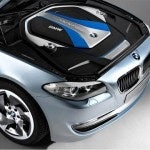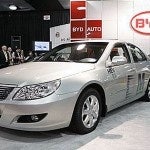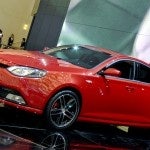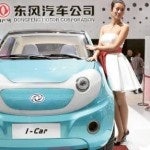BMW, "China's Favorite Brand," Readies Plug-In Hybrid Specifically Designed For China#
A roundup of recent news from the Chinese automotive industry, where questions have arisen in the wake of the Japanese earthquake and tsunami about Chinese automotive manufacturing capabilities while demand from first-time buyers remains high despite recent moves by the Beijing government to restrict the number of new cars on the road.

BMW To Unveil Plug-In Hybrid "From China For China" (The Independent)
The Independent reports that BMW will debut a new "China-only" plug-in hybrid at the upcoming Auto Shanghai show (April 21-28). Unsurprisingly, the new "e-car" -- based on the BMW 5-Series -- is being designed with the country's growing ranks of wealthy auto-buyers in mind, decked out with the longer wheelbase seen on its similarly China-only predecessor, the 545Li, which is so popular among the country's chauffeur-transported elite. (Or those who want to emulate them.) Like the 535Li, the new hybrid will include China-focused touches like sun blinds, a folding table in the rear seat, and an entertainment system, making it something of a miniature, more eco-friendly limo. From the Independent:
The New Energy Vehicle is one of a host of models expected to launch at the Auto Shanghai event, a show which will likely see more environmentally-friendly and luxury vehicles than ever before as automakers vie for the attention of China's eco-aware market.
BMW is on something of a roll in China at the moment, coming off a year of record sales there in 2010 and perhaps buoyed by the claim by Hong Kong-based brand consultancy Clear Asia that the German automaker is now "China's favorite brand."

Japan Earthquake Rattles Carmakers In China (Xinhua)
Xinhua writes this week that the disruption that the earthquake, tsunami and nuclear disaster still unfolding in Japan are having on the global automotive supply chain is now causing a ripple effect in China. In the wake of the disasters, Japanese carmakers and parts producers have shut down operations due to damage to their factories and infrastructure, and the ensuing delays in shipments of raw materials are hitting Chinese companies, particularly those funded by Japanese automakers. This is causing a rethink in the domestic Chinese auto industry about the country's ability to source raw materials from elsewhere and boost its capacity for indigenous innovation. From Xinhua:
Chinese auto parts makers should learn a lesson from the supply chain crisis and move up the value chain, experts said.
China's auto industry should also boost indigenous innovation, particularly with increasing investment on the research and development of key components, said Li Junjiang, the head of the School of Economics under Jilin University.
"China has become the world's largest auto market, but we cannot call it an auto power," Li said.

Independent Chinese Carmakers "Facing Tougher Times" (Just-Auto)
The auto industry blog Just-Auto looks this week at the difficulties faced by independent Chinese automakers like BYD and Geely, which are trying to make a name for themselves both at home and abroad but face not only consumer resistance but also the realities of the highly fragmented Chinese auto industry. From Just-Auto:
Becoming internationally competitive requires higher industrial concentration, more volume per company. If further industrial consolidation is ahead – and it is – there's a need to present your company as a 'winner' on the domestic stage. Highlighting ambitious export plans plays well at home. So does attracting high-profile international investors with what sounds like clever future-oriented automotive technologies (as BYD attracted Warren Buffett with its ambitious soundings electric car tech claims).
Investors should tread carefully. As the Chinese car market cools, the challenges facing Chinese OEMs will intensify. There is talk of an emerging price war at home.
Will China's indigenous auto industry eventually graduate to international markets as Japan's and South Korea's did? There seems little doubt that it will eventually happen. But it will likely take time and the sheer size of China's market has complicated things, acting to slow international expansion plans further. And the indigenous product, with some exceptions, is generally not quite ready for a serious assault on international markets (anyone recall Hyundai's premature and disastrous foray into North America in the 1980s?).
How will China's auto industry shape up over the next five years? Some big uncertainties remain. The large groups with foreign joint ventures are spawning new local brands, which will compete with the independents for the new and relatively price-sensitive Chinese consumer. Where will the domestic market settle and what brands will prove to be hits with Chinese consumers? Will EVs figure prominently and if so, how big a role will government – central and local – play in making that happen with incentives, charging infrastructure?
The writer adds that the next five years will be more challenging for all automakers in China, but particularly for independent carmakers, who have to not only increase their volume but also develop better products as Chinese buyers become more discriminating.

MG6 getting strong reviews in the UK (China Car Times)
It may not launch in the United Kingdom until May, but the new MG6 by the SAIC-owned company MG is getting great early reviews in the British press, reports China Car Times. Speculation about the MG6 has been rife in the Western press for several months, but if the early reviews are any indication, the 300+ British engineers who worked on the project might just turn out a hit. From China Car Times:
[W]hat have we learned from these reviews? It’s obvious that MG is getting some good reviews from major automotive outlets (aside from the Express and Star) and should easily reach its first year aim to sell a mere 2,000 units in the UK market. The fact that the car is mostly made in China and assembled from kits does not seem to affect the UK automotive press. The ear and nose hair brigade (aka MG Enthusiasts) do not seem to be pleased by the new MG styling, although their opinion can largely be discounted as they believe anything produced later than the MG Midget is not a real MG, plus they tend to buy their motors once they are antiques and being sold for pennies on Ebay, so not exactly the target audience this time around – although it should be said that enthusiasts do some good for the brand with their mad ranting.
The MG6 is gaining traction in the Chinese market, it initially sold well after its launch but sales floundered and then eventually picked up again. Chinese roads are a sea of bland automotive designs, Toyota’s, Honda’s and VW’s rule the roost on Chinese roads, the only cars that tend to turn heads are awkwardly designed Chinese cars such as the Chery QQme and some of GM’s recent efforts, and of course the MG6.
So what’s in store for MG internationally? MG are likely to use their UK base to expand sales across the European mainland and then possibly look at the US market once again. SAIC has extremely deep pockets and with it being a state owned enterprise it has close ties to the Chinese government, who of course are eager for Chinese companies to turn from contract producers to brand managers with world class and eventually world leading products. A new MGTF is likely to launch in 2013, although a diesel MG6 is due long before that, hopefully a wagon will also launch. At the Shanghai Auto Show next month we are going to see the Crossover version of the MG3 which will replace the aging Streetwise and after that we will see the MG5 hatchback and the long rumored MG SUV.

Cars Are Changing Chinese Culture, And China Is Changing The Global Automotive Industry (GulfNews)
GulfNews, via the Financial Times, writes this week about how China's growing car culture is, by extension, having an effect on modern Chinese culture. The article looks at first-time car buyers and how ownership is changing their social dynamics and society at large. From the article:
The liberal use of stickers, decals, furry seat covers, dashboard-mounted perfume canisters and customised slogans makes each Haval — a model produced by Great Wall, a local automaker, and until recently called the Hover — an expression of its owner's personality. No one at the offroad caper can easily mistake his or her car for anyone else's.
No country on earth has ever bought so many cars in so little time as China. Thirty years ago, 5,000 passenger vehicles were made on the mainland annually; last year, the figure was 11 million. That boom is having profound effects, both inside and outside the country: cars are changing Chinese culture and China is changing the global automotive industry.
Overseas, Chinese tastes are beginning to shape the cars sold worldwide, as manufacturers increasingly tailor their models to meet the demands of what has become the world's largest car market. Within China, the birth of a vibrant new culture of the automobile is boosting sales of everything from chrome wheels to prosthetic limbs — inexperienced drivers are prone to gruesome crashes.
The hitherto bicycling masses, or at least the richer among them, are buying, financing, servicing, decorating and wrecking cars at a rate not seen since America in the days of the Model T, Japan in the 1960s or Korea in the 1980s. It is very much a car boom with Chinese characteristics — and it is having a profound effect on everything from the economy to the fabric of society.
Chinese are buying cars when their income hits the same threshold that prompted mass automisation in Europe, Japan and South Korea. But China's car culture is evolving very differently from elsewhere, says Bill Russo, head of Beijing's Synergistics, an automotive consultancy, and former head of Chrysler in China. "This is a culture that people from afar see as very uniform, but when you experience it at first hand you realise how unique and personal people like to be . . . because they want to break away from the pack."